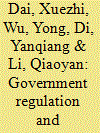|
|
|
Sort Order |
|
|
|
Items / Page
|
|
|
|
|
|
|
| Srl | Item |
| 1 |
ID:
110055


|
|
|
|
|
| Publication |
2011.
|
| Summary/Abstract |
This article gives a retrospective analysis of large-scale programs of regional development implemented on the territory of the Russian Far East beginning from the 1930s. A conclusion has been drawn that "dif-fuseness" of targets and/or "atomism" of financial resources leads to failure of programs. An analysis of the strategy of the socio-economic development of the Far East and the Baikal region up to 2025 has revealed the lack of concrete tasks and the need to revise the document.
|
|
|
|
|
|
|
|
|
|
|
|
|
|
|
|
| 2 |
ID:
088199


|
|
|
|
|
| Publication |
2008-09.
|
| Summary/Abstract |
The supervision of energy efficiency in government office buildings and large-scale public buildings is the main embodiment for government implementation of Public Administration in the fields of resource saving and environmental protection. Aimed at improving the current situation of lack of government administration in building energy efficiency, this paper proposes the concept of "change and redesign of governmental supervision in building energy efficiency", repositioning the role of government supervision. Based on this theory and other related theories in regulation economic and modern management, this paper analyzes and researches the action and function of all level governments in execution of the supervisory system of building energy efficiency in government office buildings and large-scale public buildings. This paper also defines the importance of government supervision in energy-efficiency system. Finally, this paper analyzes and researches the interaction mechanism between government and owners of different type buildings, government and energy-efficiency service institution with gambling as main features. This paper also presents some measurements to achieve a common benefit community in implementation of building energy-efficiency supervisory system.
|
|
|
|
|
|
|
|
|
|
|
|
|
|
|
|
| 3 |
ID:
192738


|
|
|
|
|
| Summary/Abstract |
Low-carbon technology innovation (LCTI) is key to achieving energy conservation and emission reduction. As the main body of carbon emissions, accelerating the promotion of energy enterprises' LCTI is urgently needed. Based on the importance of horizontal coopetition and government regulation for enterprises' LCTI, this paper establishes a tripartite evolutionary game model of local government and two homogeneous energy enterprises to clarify their dynamic behavior strategies. Furthermore, through numerical simulation, a sensitivity analysis of the effect of the main parameter changes on all parties' evolution is carried out. Moreover, we obtained the accurate optimal value of S&P (subsidies and penalties) by using a combination of random jumping and L-BFGS-B method. The findings indicate that (i) increasing the initial willingness of government and enterprises can facilitate faster system evolution towards optimal state. Early governmental intervention can be beneficial in preventing negative behavior of enterprises. (ii) There exists optimal range, and even optimal level, for government S&P, with penalties being more effective than subsidies in promoting LCTI. (iii)Low coopetition is ineffective while the intensity of coopetitive relationship is positively correlated with its’ effect. (iiii) Small-scale enterprises are more sensitive to changes in S&P measures and coopetition relationships.
|
|
|
|
|
|
|
|
|
|
|
|
|
|
|
|
| 4 |
ID:
126875


|
|
|
|
|
| Publication |
2011.
|
| Summary/Abstract |
The article presents the author's views regarding the implementation of Qalandia Checkpoint in Jerusalem. The author denotes that the said checkpoint is part of the Israeli government's closure enforcement in the Occupied Palestinian Territories (OPT). In addition, the author cites that the said checkpoint is intended to control the movements of the Palestinian Arabs in the city and in the West Bank. Moreover, the author also notes the poor settlement condition of Palestinians in East Jerusalem.
|
|
|
|
|
|
|
|
|
|
|
|
|
|
|
|
| 5 |
ID:
103601


|
|
|
|
|
| Publication |
2011.
|
| Summary/Abstract |
The last decade has seen significant innovation and change in regulatory incentives to support photovoltaic deployment globally. With high fossil fuel dependency and abundant solar resource availability in Australia, grid connected photovoltaics are a viable low carbon technology option in existing electricity grids. Drawing on international examples, the potential to increase grid PV deployment through government response and regulation is explored. For each renewable energy certificate (REC) earned by small scale photovoltaics until 2012, the market provides four additional certificates under the current banded renewable targets. Our analysis indicates that REC eligibility is not accurately estimated currently, and an energy model is developed to calculate the variance. The energy model estimates as much as 26% additional REC's to be obtained by a 3 kWp PV system, when compared to the currently used regulatory method. Moreover, the provision of REC's increases benefits to PV technologies, in the process distorting CO2 abatement (0.21 tonne/REC) by 68%, when PV displaces peaking natural gas plants. Consideration of the secondary effects of a banded structure on emissions trading market is important in the context of designing a range of initiatives intended to support a transition to a low carbon electricity sector.
|
|
|
|
|
|
|
|
|
|
|
|
|
|
|
|
| 6 |
ID:
166378


|
|
|
|
|
| Summary/Abstract |
Under pressure to reduce emissions and protect the environment, China has been vigorously promoting the development of renewable energy. In recent years, wind power generation in China has developed very quickly, but its overall use ratio is very low and there are still many obstacles impeding further development of wind power. Firstly, this paper systematically analyzes the relationship between different influencing factors of wind power growth, including the level of government regulation and the impact of vested interest groups, based on the private interest theory of government regulation. Secondly, we use panel data from 31 Chinese provinces to examine the theoretical assumptions. The results show that the delegation of approval authority led to the growth of regional wind power installed capacity. The influence on local government by the local thermal power industry exerted a negative impact on the development of local wind power when the local government held the approval authority. However, this influence relation disappeared when the central government held the approval power. Thus, the government needs to make a trade-off between different levels of approval authority. The paper concludes with several suggestions to promote China's wind power development.
|
|
|
|
|
|
|
|
|
|
|
|
|
|
|
|
|
|
|
|
|